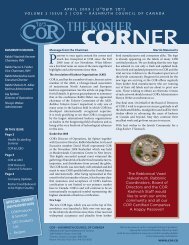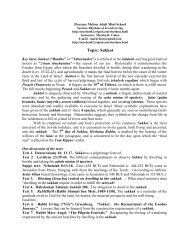The Religious Policy of Xerxes and the "Book of Esther"
The Religious Policy of Xerxes and the "Book of Esther"
The Religious Policy of Xerxes and the "Book of Esther"
Create successful ePaper yourself
Turn your PDF publications into a flip-book with our unique Google optimized e-Paper software.
XERXES AND THE BOOK OF ESTHER-LITTMAN<br />
I49<br />
Es<strong>the</strong>r is identical with Ishtar.16 Es<strong>the</strong>r's second name,<br />
Hadassah, has posed more <strong>of</strong> a problem. Usually it has been<br />
connected with <strong>the</strong> Hebrew word meaning myrtle. In fact<br />
<strong>the</strong> biblical commentators explained that she had a Jewish<br />
name Hadassah, <strong>and</strong> a secular name, Es<strong>the</strong>r, much as Jews<br />
have adopted two names in o<strong>the</strong>r periods <strong>of</strong> history.l7 However,<br />
Lewy has proposed what must be <strong>the</strong> correct derivation<br />
<strong>of</strong> <strong>the</strong> name.l8 <strong>The</strong> Hebrew ;-rT is not connected with myrtle,<br />
but ra<strong>the</strong>r with <strong>the</strong> Akkadian hadasatu, a synonymn <strong>of</strong> <strong>the</strong><br />
Assyrian kallatu "bride". Thus nOTm is an epi<strong>the</strong>t <strong>of</strong> Es<strong>the</strong>r.<br />
Fur<strong>the</strong>r Es<strong>the</strong>r <strong>the</strong> Queen ((;ron n inoN) is a literal translation<br />
<strong>of</strong> <strong>the</strong> Babylonian term Igtar sarratum, Ishtar <strong>the</strong> Queen.<br />
If <strong>the</strong> <strong>Book</strong> <strong>of</strong> Es<strong>the</strong>r is originally a non-Jewish story, <strong>and</strong><br />
Es<strong>the</strong>r <strong>and</strong> Mordecai non-Jews, it remains for us to identify<br />
<strong>the</strong> persecuted. Julius Lewy 19 suggests that when Artaxerxes<br />
II <strong>of</strong>ficially instituted <strong>the</strong> cult <strong>of</strong> Mithra <strong>and</strong> <strong>the</strong> goddess<br />
Anahita in Susa, <strong>the</strong>ir followers threatened those <strong>of</strong> Marduk<br />
with destruction, but <strong>the</strong> latter were saved by "Ishtar". Lewy<br />
sees <strong>the</strong> <strong>Book</strong> <strong>of</strong> Es<strong>the</strong>r as a confused amalgam <strong>of</strong> this historical<br />
event <strong>and</strong> a Judaization <strong>of</strong> <strong>the</strong> story. He makes a persuasive<br />
argument that <strong>the</strong> original persecution mentioned in <strong>the</strong> <strong>Book</strong><br />
Jerusalem with Zerubbabel (Ezra 2.2). It is attested in Aramaic; see<br />
G. R. Driver, Aramaic Documents <strong>of</strong> <strong>the</strong> Fifth Century B.C. (Oxford<br />
1957) 20 n. 2. It also occurs in <strong>the</strong> Treasury Tablets from Persepolis;<br />
see G. G. Cameron, <strong>The</strong> Persepolis Treasury Tablets (Chicago 1948) 85;<br />
<strong>and</strong> it is also found in an undated text, probably from <strong>the</strong> end <strong>of</strong> <strong>the</strong><br />
reign <strong>of</strong> Darius or beginning <strong>of</strong> <strong>Xerxes</strong> as <strong>the</strong> name <strong>of</strong> an <strong>of</strong>ficial,<br />
perhaps a scribe or accountant, on tour from Susa; see A. Ungnad,<br />
Keilinschriftliche Beitrage zum Buch Esra und Ester," ZAW 58<br />
(1940-41) 240-244 <strong>and</strong> addenda in ZA W 59 (I942-43) 219.<br />
16<br />
Lewy, op. cit., 128 n. 14.<br />
17<br />
Although many biblical critics <strong>and</strong> scholars from antiquity have<br />
argued that Es<strong>the</strong>r <strong>and</strong> Mordecai are merely <strong>the</strong>ophoros names <strong>and</strong><br />
represent secular names, much as Jews in Daniel I.6-7 had a Jewish<br />
<strong>and</strong> Babylonian name [see Moore, op. cit., 19], <strong>the</strong> collocation <strong>of</strong> <strong>the</strong><br />
names Es<strong>the</strong>r <strong>and</strong> Mordecai, <strong>the</strong> names <strong>of</strong> a Babylonian god <strong>and</strong><br />
goddess, closely allied in <strong>the</strong> Babylonian pan<strong>the</strong>on, makes one very<br />
suspicious <strong>of</strong> this interpretation.<br />
18 Lewy, op. cit., 128.<br />
19<br />
Lewy, op. cit.





